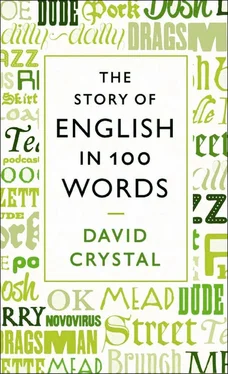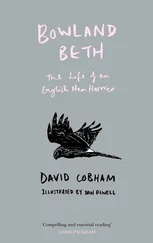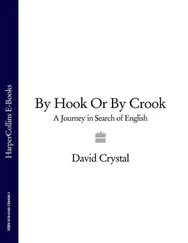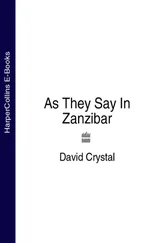Eventually, as we now know, the present-day use of lunch and dinner became established among the fashionable classes. As the 20th century dawned, the pages of Punch magazine are full of references to business lunches and evening dinner parties. Meanwhile, the lower orders of society continued to use dinner for their midday meal, and so the U/non-U distinction was born. But the story of lunch and dinner is not over yet. Expressions such as lunch-box and packed lunch have reinforced a change of usage among many non-U children, so that they now happily talk about school lunches (though still served by dinner ladies). However, when chef Jamie Oliver started his campaign on British television in 2005 for more nutritious food in school lunches, he called it Jamie’s School Dinners.
 66. Dude — a cool usage (19th century)
66. Dude — a cool usage (19th century)
Dude is another word whose origin is unknown. All we know is that it suddenly appeared in 1883 in New York. The London newspaper The Graphic reported its arrival in March of that year as ‘American slang for a new kind of American young man’. A couple of months later, the North Adams Transcript of Massachusetts confirmed its spread: ‘The new coined word “dude”… has travelled over the country with a great deal of rapidity since but two months ago it grew into general use in New York.’ Rarely do we find such a precise dating of a word ( §83). But who coined it, and why, remains a mystery.
Dudes were aesthetes and dandies — any man who was extremely fastidious about his clothes, speech and general behaviour. They often dressed in a British way and affected a British tone of voice. If you were clothed like a dude, you were duded up . But soon the word began to extend its meaning. Any city-dweller who went ‘out West’ as a tourist would be called a dude. Dude ranches developed to cater for the demand from city dudes. And it wasn’t long before the female dude was identified — and given a name: dudess or dudine , though neither of these words has survived.
By the turn of the century, anyone who stood out in a crowd was being called a dude. In small-group settings, such as school classrooms, street gangs and jazz clubs, it became a term of approval. Eventually any group of people hanging out together would refer to themselves as dudes. It became one of a large number of ‘cool’ slang terms for people, such as cat (in the jazz world) and geek (in the computer world).
By the 1970s dude had become a chatty term of address for both men and women, especially popular in American university campuses and often heard in high school and college movies. Bill and Ted’s Excellent Adventure (1989) contained such famous lines as ‘All we are is dust in the wind, dude!’ and ‘How’s it goin’, royal ugly dudes?’ Bill and Ted’s teacher, Mr Ryan, is unimpressed by the usage.
Mr Ryan: So Bill, what you’re telling me, essentially, is that Napoleon was a short, dead dude.
Bill: Well, yeah.
Ted (to Bill): You totally blew it, dude.
 67. Brunch — a portmanteau word (19th century)
67. Brunch — a portmanteau word (19th century)
We know the year that brunch entered the English language. According to the satirical magazine Punch , it was 1895. This is what a writer in August 1896 had to say about it:
To be fashionable nowadays we must ‘brunch’. Truly an excellent portmanteau word, introduced, by the way, last year, by Mr. Guy Beringer, in the now defunct Hunter’s Weekly , and indicating a combined breakfast and lunch.
Indeed he did. Beringer’s article, ‘Brunch: A Plea’, proposed an alternative to the Sunday ‘postchurch ordeal of heavy meats and savoury pies’. Brunch, said Beringer, ‘puts you in a good temper, it makes you satisfied with yourself and your fellow beings, it sweeps away the worries and cobwebs of the week’.
There certainly is a quirky freshness about the name, which is still with us. It caught on, and by the 1930s the noun was also being used as a verb: ‘I brunched with Jim’, someone might say. We also find it being used to make compound words, such as brunch-style and brunch box . In the 1940s, a type of women’s short house-coat was called a brunch coat . By the 1960s a new kind of eating-house had emerged: the brunch-bar . And Cadbury used that name for a chocolate-covered cereal bar.
The Punch writer called brunch a portmanteau word. A portmanteau , as its French origin suggests, was a small case which a horse-rider could use to carry ( porter = ‘to carry’) a cloak ( manteau ) or other clothes or belongings. But it changed its meaning in the late 19th century, after Lewis Carroll used it in Through the Looking-Glass (1871) to explain his coinages in ‘Jabberwocky’. Slithy , says Humpty Dumpty, ‘means lithe and slimy … it’s like a portmanteau — there are two meanings packed up into one word’. Today, linguists tend to call such words blends — but there is something rather appealing about Lewis Carroll’s usage which has kept the older term in vogue.
The meaning of a portmanteau word is different from the sum of its parts. Brunch isn’t two meals — breakfast and lunch — but a meal that is different from either. And this is the pattern we find in all portmanteau words. A spork is neither a spoon nor a fork, but a new device that mixes properties of both. A motorcade is not a motor car nor a cavalcade, but a new kind of procession.
Portmanteaus have been part of the English language for centuries. Tragicomedy dates from the 16th century; Oxbridge from the 19th. But blending became one of the most popular ways of coining new words during the 20th century. Spork is first recorded in 1909 and motorcade in 1913, and hundreds of others followed — such as gasohol, internet, interpol, motel, chocoholic, docusoap and guestimate . Informal English has a special liking for them — fantabulous, ginormous, happenstance . The process is especially popular today ( §98).
Some of the most unusual blends appear in house-names — if Derek and Susan set up house together, they might call their place Dersan or Suerek . And the tabloid media love to join the names of famous couples together in a personal portmanteau. Who was/were Brangelina ? Brad Pitt and Angelina Jolie. And who was/were Bennifer ? Ben Affleck and Jennifer Lopez. Whether the whole is different from the sum of the parts, in such cases, is a moot point.
 68. Dinkum — a word from Australia (19th century)
68. Dinkum — a word from Australia (19th century)
On 29 April 1770, Captain Cook arrived in Australia. Two months later he writes in his journal: ‘One of the Men saw an Animal something less than a greyhound; it was of a Mouse Colour, very slender made, and swift of Foot.’ They soon learned its local name. Cook writes on 4th August: ‘called by the Natives Kangooroo, or Kanguru’. It was the first of many words that would eventually become a feature of Australian English.
The aboriginal languages of the region supplied some of the most distinctive items. Local animals, landscape and culture are reflected in billabong, dingo, koala, wombat, budgerigar, kookaburra and boomerang , Less distinctive, but more numerous, were words from British English used in new ways. A paddock in Britain was a small animal enclosure; now it described a vast tract of rural land. Swag was a slang word for a thief’s booty; it came to mean a bundle of personal belongings carried by a traveller in the bush. A footpath is paved in Australia — what in Britain would be a pavement and in the USA a sidewalk .
Читать дальше

 66. Dude — a cool usage (19th century)
66. Dude — a cool usage (19th century) 67. Brunch — a portmanteau word (19th century)
67. Brunch — a portmanteau word (19th century) 68. Dinkum — a word from Australia (19th century)
68. Dinkum — a word from Australia (19th century)










